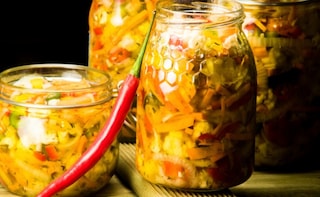I remember the time when the art of pickling was a closely-guarded family secret kept by every household. Pickles were meant to be created only in our kitchens where mothers and their mothers spent merry hours together — peeling, slicing, stirring, and bottling them in martbaans. You could spot these fat ceramic jars, dressed in nothing but a malmal ka kapda, sunbathing on the terrace any time of the year. In days to come, it would transform into a delicious condiment that was proudly served with every meal. It’s not just the science of mixing everything together in the right proportion, pickling is a craft that requires a certain kind of passion – not to forget patience and precision. We all have grown up with some sort of pickle that reminds us of many summer afternoons preserved in the memory and in the jar.
Chef Nithya RaviJuicy lemons blended with spices, a pickle that will leave your tongue tingling.
Chef Nithya RaviThis fiery pickle is the best way to save seasonal mangoes in a jar.
If you're too lazy to get into the kitchen, there's a lot out there to explore. Pickles with organic vegetables, pickles in olive oil, oil-free pickles made in sabudana water and those that will remind you of your grandmother.
Advertisement
Advertisement
Chef Nithya Ravi
Advertisement
Chef Nithya RaviThis fiery pickle is the best way to save seasonal mangoes in a jar.
If you're too lazy to get into the kitchen, there's a lot out there to explore. Pickles with organic vegetables, pickles in olive oil, oil-free pickles made in sabudana water and those that will remind you of your grandmother.
For the latest food news, health tips and recipes, like us on Facebook or follow us on Twitter and YouTube.
Advertisement
